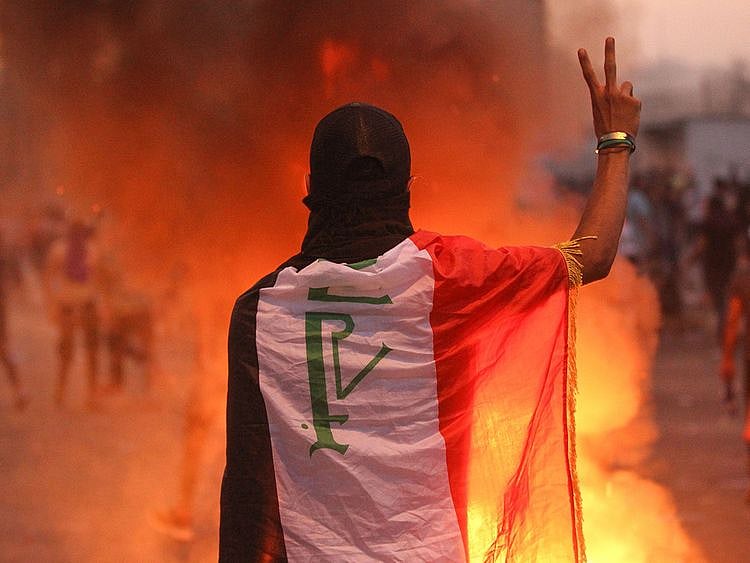Iraq is a nation not yet fully healed
Nation remains in suspended animation, where governments are started but nothing begins

Also In This Package
Iraq, which in history has always had a pungent association for Arabs, fondly known by them as the “land between the two rivers”, does not appear to have recovered from the unintended consequences of the 2003 the American invasion. In short, it is a nation not yet fully healed.
The latest reminder of this fact is the wanton assassination of activists in Basra last week. Among those was that of Rihan Yacoob, a 29-year-old doctor who had led local antigovernment protests there. She was shot dead by unidentified gunmen who opened fire on her car with an assault rifle and then took off on the back of a motorcycle.
Her death came several days after the assassination of Tahseen Osama, another Basra activist. On September 18 yet another high profile figure in the protest movement, Saud Ali, was shot dead in a street downtown. (Lest we forget, the murder of Yacoub and Osama came just over a month after the brazen assassination of prominent political commentator Hisham Al-Hashimi in Baghdad.)
Iraq’s prime minister, Mostafa Al-Kadhimi, expressed his distress, and vowed to do “everything necessary” to have the security forces apprehend “the outlaws” behind the mayhem, suspected of being members of Iranian-backed militias. Good luck!
These militias are well-entrenched groups who play an outsize role in Iraqi politics and the government’s own underfunded, undertrained security forces are no match to them. They embrace a rigid, intolerant vision of social order backed by the menacing threat that those in opposition to that vision should be, well, offed.
What kind of statement is that making about the fabric of communal life in Iraq?
It shouldn’t take a social scientist to remind us that in a social system, intolerance is guaranteed to build not bridges but walls among citizens, leading inexorably to a fractured body politic.
Ms Yacoob was not unlike countless other activists who took to the streets late last year, before the Covid-19 pandemic reached Iraq, to express their anger at pervasive corruption, high unemployment, dismal public services and foreign intervention in the country via local elements whose loyalties to nation are ancillary to those of sect.
Silenced for her ideas
She was part of the adversarial current in society, made up of individuals whose necessary role in social life is to seek an articulation of the fragile plurality of human nature and conduct.
Come to think of it, to kill someone because you disagree with their views is an act suffused with irony. For by doing that you pay tribute — a sinister tribute to be exact, but tribute nevertheless — to the value, indeed to the power of ideas in human affairs.
Those who assassinated Ms Yacoob and her two other fellow activists, and those security forces and gunmen with links to militias who shot to death well over 500 protesters and injured thousands in last year’s demonstrations, effectively did just that: They evinced fear of the value, the power of ideas in human affairs, feat of how it is the life of the mind that, at the end of the day, enriches our human being and thrusts us beyond our fixed meaning.
Those who ordered the hit on Ms Yacoob did not see her as a petite, bespectacled 29-year-old physician, but as an engaged reformist with ideas relevant to — indeed ideas that are a necessary function of — the emergence of a stable, prosperous, pluralistic society in Iraq.
To these zealots, imbued as they are with a doctrinaire view of the world, she was a danger to the paradigm they embraced. So off with her.
To the rest of us, however, offing a reformist is a crime most foul, as it were, a crime against the very foundation of what constitutes a civilised society.
Mean while, back in Basra — in Iraqi folklore, the port city from which Sinbad the Sailor, the fictional Baghdadi mariner in A Thousand and One Nights, set out on his seven voyages throughout the seas, during the Abbasid Caliphate, and the city that in its heyday in the 8th and 9th centuries was a brilliant cultural centre, home to noted philologists, poets, writers, philosophers and theologians — demonstrators last week, outraged at news of the assassinations, torched the local parliament building and the headquarters of a number of Iran-backed groups, demanding a thorough investigation. Noted again, good luck!
As for the rest of Iraq, well, the nation remains in suspended animation, where new governments are started and nothing begins, diffuse restlessness among the populace reigns and ordinary Iraqis feel, if only viscerally, that the future perfect has somehow disappeared as a tense in the grammar of their national being. Sad, no?
— Fawaz Turki is a journalist, lecturer and author based in Washington. He is the author of The Disinherited: Journal of a Palestinian Exile
Sign up for the Daily Briefing
Get the latest news and updates straight to your inbox
Network Links
GN StoreDownload our app
© Al Nisr Publishing LLC 2026. All rights reserved.